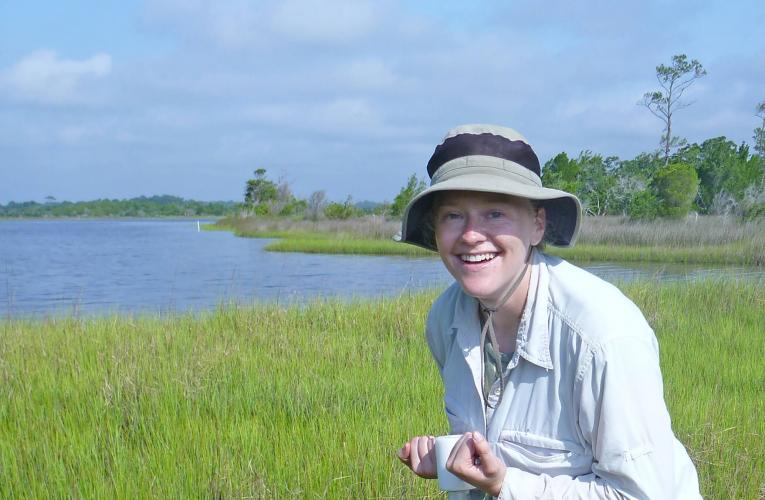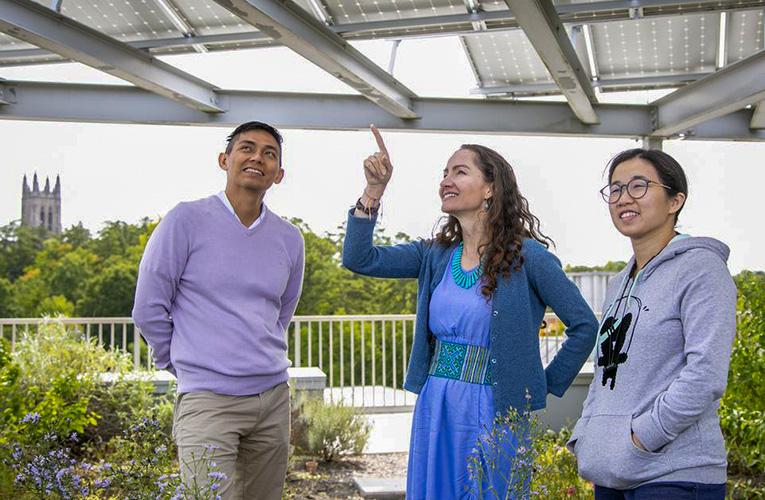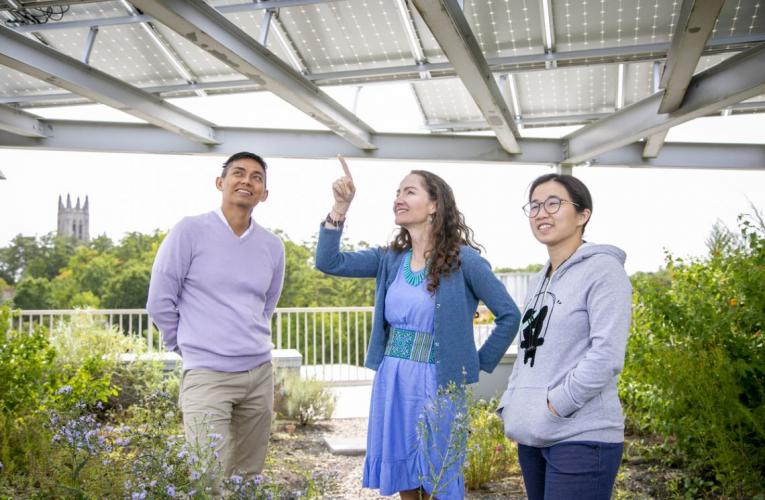Program Overview
The graduate program in Environment (ENV) offers students opportunities to work with faculty who specialize in an array of disciplines within the physical, chemical, biological, and social sciences, as well as integration among them. Because of the intensive research nature of this degree, course work is tailored to the particular needs of the research topic agreed upon by the student, the faculty mentor and committees involved. The ENV program is organized around four research themes:
-
Ecosystem Science, which emphasizes conservation ecology, landscape ecology, wetland ecology, forest ecology, soils, biogeochemistry and hydrology of watersheds
-
Environmental Chemistry and Toxicology, which emphasizes the fate and effects of natural and anthropogenic stressors, particularly chemicals, in the environment
-
Aquatic and Atmospheric Sciences, which concentrates on problems spanning natural divisions of the biosphere- soil, plants, lakes, watersheds, and the atmosphere
- Environmental Social Systems, which emphasize the management of natural resources and the environment by individuals and societies.
Faculty & Students
Student name (matriculation year)
- Jennie Bahramian (2023)
- Jalal Bayar (2024)
- Christina Bergemann (2020)
- Chainey Boroski (2020)
- Elizabeth Boxer (2022)
- Ruoxue Chen (2022)
- Emily Craig (2021)
- Shaza Gaballah (2019)
- Yihui Ge (2020)
- Alex George (2022)
- Emily Green (2021)
- Ankita Gupta (2020)
- Mauricio Hernandez (2019)
- Rebecca Hoehn (2021)
- Shaunacee Howell (2020)
- Taylor Hoxie (2019)
- Miao Hu (2022)
- Laura Jameson (2022)
- Siqi Liang (2020)
- Ilaria Merutka (2020)
- Michelle Misselwitz (2021)
- Katherine Morton (2019)
- Reshma Nargund (2018)
- Tyler Norris (2023)
- Sara O'Malley (2023)
- Jocelyn Painter (2022)
- Kelly Perry (2024)
- Lauren Prox (2020)
- Caroline Rowley (2024)
- Daniel Tobin (2021)
- Skye-Anne Tschoepe (2023)
- Guru Ulaganathan (2023)
- Jianxing Wan (2023)
- Xiangtian Wang (2019)
- Peter Wasswa (2024)
- Yu Wei (2024)
- Tenley Weil (2022)
- Elizabeth Weyl (2024)
- Xiaodong Zhang (2020)
How to Apply
- Before applying to the Environment doctoral program it is critical to identify one or a few professors you would like to work with who can discuss program options and direct you to the appropriate program. No student will be admitted, no matter how good his or her credentials, unless a member of the faculty has the interest and ability to mentor (and in some cases fund) the student. For further information, contact Jennifer Jo Wernegreen, Director of Graduate Studies (DGS) or one of the professors who mentor in the Environment program.
- Applications are entirely through Duke’s Graduate School. The Doctoral program application is available online.
See the Duke Graduate School for details about admission and degree requirements.
For Current & Admitted Students
Please consult the Graduate School website for most information. We cannot recapitulate all of the information from the Graduate School here; it is your responsibility to familiarize yourself with this website, and consult it as needed. However, some key information is listed below. We (the DGS and DGSA) are happy to help clarify any questions that arise.
The certification meeting
The certification meeting is an in-person meeting of the student and the proposed thesis committee. It should typically occur in the second year of study. The purpose of the certification meeting is to officially form the thesis committee. This meeting must occur at least 30 days prior to the prelim. Please check the Graduate School website for the specific paperwork that you need to submit and requirements for thesis committee composition; in addition, please fill out this ENV-specific form, have it signed, and turn it in to the DGSA. Additional paperwork is typically required ahead of time in order to include committee members who are not full Duke faculty.
The “prelim”
The preliminary exam is an examination that lasts up to (but no more than) 3 hours and is intended to test the students’ preparation to carry out dissertation research. It should occur at the end of the second year or beginning of the third year, and must occur by the end of the 3rd year, unless an exception is requested of and granted by the Graduate School. The format of the exam varies from research group to research group within ENV, but is generally an oral examination that includes evaluation the students’ general intellectual preparation (i.e., broad knowledge of the field of study) as well as evaluation of a written PhD research proposal sent by the student to the committee at least two weeks prior to the prelim.
The prelim is conducted by the PhD thesis committee, and all committee members must be present. Note that the rules governing this exam are set by the Graduate School. After passing this exam, students are officially “PhD candidates.” Please check the Graduate School website for the specific paperwork that you need to submit, and ensure that an evaluation form is filled out by all committee members and given to the DGSA by the advisor. Additional paperwork is required ahead of time in order to have remote participation. A short description of the prelim is here.
The Graduate School will automatically withdraw students who have not prelimmed by the end of their 4th year, without appeal.
Annual meetings
You should have a meeting with your thesis committee at least once per year after passing your prelim. If this does not occur, you and your advisor will need to explain why.
The defense and thesis
You are ready to defend! This should normally occur by the end of your 5th year. The defense includes a public presentation (normally no more than an hour including questions) and a closed examination, conducted by the PhD thesis committee. (note that the rules governing this exam are set by the Graduate School). Please check the Graduate School website for the specific paperwork that you need to submit.
Teaching assistantship requirement
All students, even those not funded by a TAship, are required to serve as a TA at least once (i.e., one semester) during their PhD tenure as part of the ENV PhD training.
Funding
PhD students may be funded by their own research grants or fellowships, by their mentor’s research funding, or by a TAship. A TAship requires serving as a TA every semester. When students’ or mentors’ research or fellowship is partial and must be supplemented by NSOE, additional TA service may be required. Students in good standing and making good academic progress will have access to 5 years of funding from Duke from the date of matriculation, even if you and your advisor are unable to obtain other forms of funding (grants, fellowships, etc). However, note that obtaining outside funding during the 5 years does not extend the 5-year timeline.
Please note that additional funding is available from The Graduate School at Duke (https://gradschool.duke.edu/financial-support/find-funding), as are other forms of support such as child care subsidies (https://gradschool.duke.edu/financial-support). Applying for grant is a very useful experience, and if you get one, it will be good for both you and your mentor!
Annual evaluations
Per Graduate School rules, you must fill out an annual self-evaluation at the end of the academic year. We will contact you to request this form.
Travel and conference funding
A once-a-year conference travel award is available for five years to enrolled ENV Phd students ($500 for oral presentations, $300 for poster presentations; contact the DGSA for details). Additionally, for students who have passed their preliminary exams, additional Graduate School travel and conference funding is available; details here. In both cases you must apply ahead of time for the funding.
Career development and teaching experience and training
A wide variety of career development opportunities are offered at Duke https://gradschool.duke.edu/sites/default/files/documents/dgs_manual_ch12.pdf and http://studentaffairs.duke.edu/career/graduate-students. These include a variety of programs that provide more extensive training in teaching, including a teaching certificate, preparing future faculty, Bass fellowships, and, in some cases, summer teaching opportunities.
Here is a blog on career development mentoring: https://gradschool.duke.edu/professional-development/blog/duke-mentor-connect-dmc
Information for international students: http://gradschool.duke.edu/student-life/student-resources#InternationalStudent





